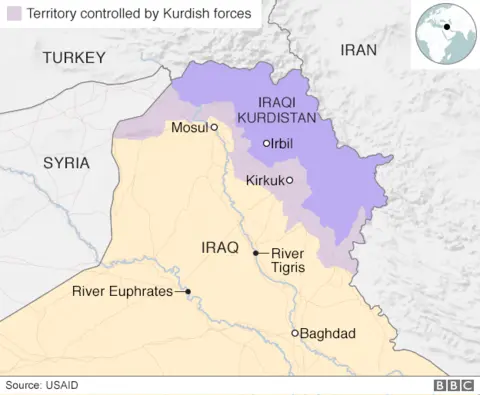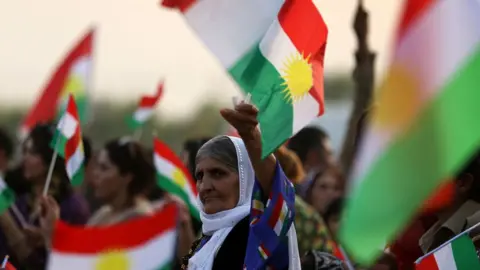Iraqi Kurdish referendum: UN warns of 'destabilising impact'
The UN Security Council has warned of the potentially destabilising impact of a planned referendum on independence for the Kurdistan Region of Iraq.
The 15 member states said Monday's non-binding vote could hinder efforts to counter so-called Islamic State (IS) and help displaced Iraqis return home.
It called for "dialogue and compromise" between the Kurdistan government and the central government in Baghdad.
Prime Minister Haider al-Abadi has said the referendum is unconstitutional.
Kurds are the fourth-largest ethnic group in the Middle East, but they have never obtained a permanent nation state.
In Iraq, where they make up an estimated 15% to 20% of the population of 37 million, Kurds faced decades of repression before acquiring autonomy in 1991.
The statement issued by the Security Council late on Thursday expressed "continuing respect for the sovereignty, territorial integrity, and unity of Iraq".
They urged "all outstanding issues between the federal government and the Kurdistan Regional Government to be resolved, in accordance with the provisions of the Iraqi constitution, through structured dialogue and compromise supported by the international community".

Council members also expressed full support for UN efforts to facilitate dialogue.
On Wednesday, the foreign ministers of neighbouring Turkey and Iran, which themselves have sizeable Kurdish minorities, agreed with their Iraqi counterpart that the referendum could divide Iraq and spark a wider regional conflict.
The ministers also said they were considering "taking counter-measures" against the Kurdistan Region, but did not provide details.
 AFP
AFPIraqi Kurdish leaders have said they are determined to press ahead with the referendum, which will take place in the three provinces that officially make up the Kurdistan Region - Dahuk, Irbil and Sulaimaniya - and "areas of Kurdistan outside the region's administration".
The latter include disputed cities such as Kirkuk, Makhmour, Khanaqin and Sinjar, over which Kurdish Peshmerga forces have established control while battling IS.
Kurdish leaders have also stressed that a "yes" vote will not trigger an automatic declaration of independence, but rather strengthen their hand in lengthy negotiations on secession with Baghdad.
However, the US has warned that such negotiations are "highly unlikely" to happen. It also said that international offers of support for genuine dialogue to resolve Iraqi Kurds' "legitimate grievances" would be "foreclosed".
The UN Special Representative for Iraq, Jan Kubis, has offered to broker negotiations that would aim to reach a deal within two or three years on the "principles and arrangements" for future relations between Baghdad and the Kurds, according to AFP news agency.
In return, the referendum would be postponed until the end of the negotiations.